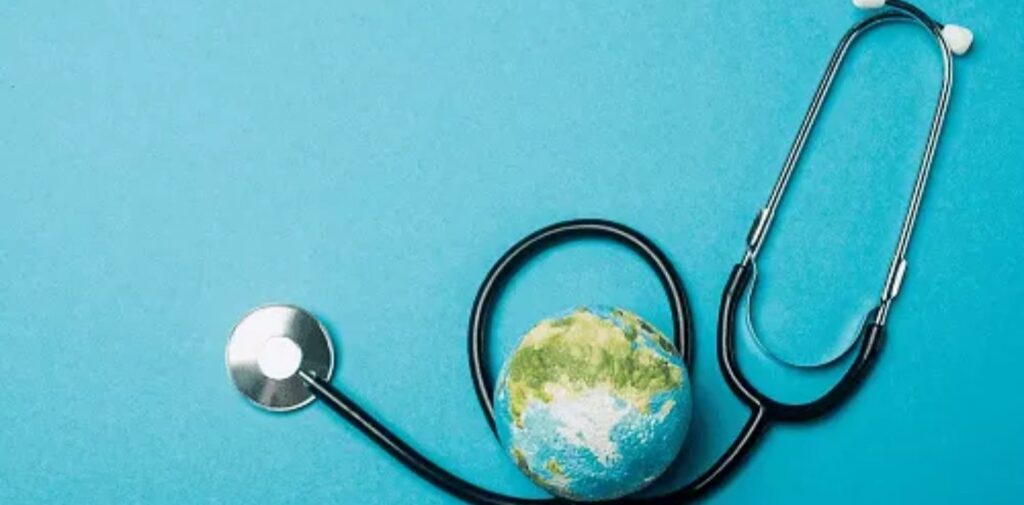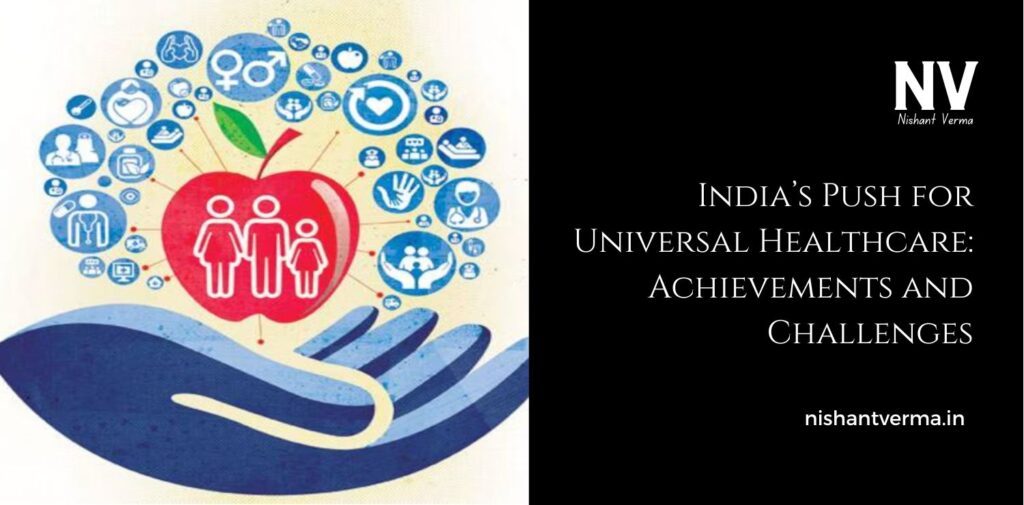India has made significant progress towards providing healthcare for all its citizens. Over the years, the country has worked hard to ensure that everyone, from the busy cities to the far-off villages, has access to the healthcare they need. This journey towards universal healthcare has had many achievements but also comes with its own set of challenges.
What is Universal Healthcare?
Before we talk about India’s efforts, let’s first understand what universal healthcare means. Universal healthcare is the idea that every person, no matter who they are or where they live, should be able to get the healthcare services they need. This includes doctor visits, medicine, surgery, and other health services, without having to worry about how much money they have. The goal is for healthcare to be affordable and accessible to all.

How Did India Start Moving Towards Universal Healthcare?
India’s journey towards universal healthcare started after it became an independent country in 1947. At that time, the government recognized that one of the most important things for the well-being of its people was good healthcare. However, providing healthcare to a population as large as India’s was not an easy task. The country faced many challenges, such as poverty, lack of education, and limited resources. But despite these challenges, India has made significant progress in expanding healthcare access over the years.
Key Achievements in India’s Healthcare System
1. Growth of Government Hospitals and Clinics
One of the biggest achievements in India’s healthcare journey is the expansion of government hospitals and clinics. These hospitals and clinics provide medical care at affordable or even free rates. Over time, the Indian government has built thousands of these healthcare centers, especially in rural areas, where private hospitals are few or far away. This has helped people in remote places get the treatment they need without having to travel far.
2. The National Health Mission (NHM)
In 2005, India launched the National Health Mission (NHM), a program designed to improve healthcare services, especially in rural areas. This mission aimed to increase the number of healthcare centers, provide better training for healthcare workers, and improve the quality of medical services. NHM has played a vital role in improving the health of millions of people by making healthcare more accessible to the poor.
3. The Ayushman Bharat Scheme
Ayushman Bharat, launched in 2018, is one of India’s most ambitious healthcare programs. Under this scheme, the government provides health insurance coverage to over 50 crore (500 million) people. This insurance covers treatment for serious illnesses, surgeries, and hospitalization. The Ayushman Bharat scheme has helped millions of poor families get healthcare without having to spend large amounts of money.
4. Improvement in Healthcare Awareness
Over the years, the government has focused on educating people about the importance of health and hygiene. Health awareness campaigns have taught people how to prevent diseases, maintain hygiene, and take care of their health. These campaigns have helped reduce the number of preventable diseases, such as malaria and tuberculosis, in India.
5. Vaccination Programs
India has made great progress in immunizing its population. The country runs massive vaccination campaigns, which have helped control diseases like polio, measles, and tuberculosis. India’s vaccination programs have saved millions of lives and are key to improving public health. The introduction of vaccines for COVID-19 is also a part of the country’s ongoing efforts to protect the health of its people.

Challenges in Providing Universal Healthcare
Despite these achievements, India still faces many challenges in achieving true universal healthcare. Let’s look at some of the major obstacles.
1. Lack of Sufficient Healthcare Workers
One of the biggest challenges is the shortage of doctors, nurses, and other healthcare workers. India has a large population, but there are not enough healthcare professionals to take care of everyone. In rural areas, this problem is even more serious, as many doctors prefer to work in cities where they can earn more money and have better living conditions. This shortage of healthcare workers makes it difficult to provide quality healthcare to everyone.
2. Poor Infrastructure in Rural Areas
Although India has made significant progress in building healthcare centers, many rural areas still lack proper infrastructure. Many healthcare centers in villages are poorly equipped, and some may not have essential medicines or modern medical equipment. The poor infrastructure makes it hard for people to get the treatment they need, especially during emergencies.
3. Financial Strain
While government programs like Ayushman Bharat are making healthcare affordable for many, there are still millions of people who cannot afford treatment. Healthcare costs can be very high, especially for serious illnesses or surgeries. Even with health insurance, many people still have to pay out of pocket for some treatments, which can push them deeper into poverty.
4. Limited Awareness in Remote Areas
Even though India has done well in raising healthcare awareness, many people in remote areas still don’t know how to take care of their health properly. They may not know the importance of vaccinations or regular checkups. Educating these communities remains a challenge, as they may not have access to enough information or healthcare workers to guide them.
5. Rising Non-Communicable Diseases
While infectious diseases like tuberculosis and malaria are still a concern, India is also facing a rise in non-communicable diseases (NCDs) like diabetes, heart disease, and cancer. These diseases are often linked to lifestyle changes, unhealthy diets, and lack of exercise. Treating and preventing NCDs is a growing challenge, as they require long-term care and expensive treatments.

What’s Being Done to Overcome These Challenges?
India has been working hard to overcome these challenges and move closer to universal healthcare. Here are some steps being taken:
1. Increasing Investment in Healthcare
The Indian government is increasing its investment in healthcare. This includes building more hospitals and clinics, upgrading the existing ones, and training more doctors and nurses. The government is also focusing on improving healthcare facilities in rural areas, where they are most needed.
2. Telemedicine and Technology
Technology is being used to improve healthcare access. Telemedicine, which allows patients to consult doctors online, is growing rapidly in India. This is especially helpful for people who live in remote areas and cannot visit a hospital easily. The use of technology helps reduce waiting times, lower costs, and make healthcare more accessible.
3. Health Insurance Programs
The government is expanding health insurance schemes like Ayushman Bharat, which help provide financial protection to poor families. These schemes ensure that families do not have to spend all their savings on healthcare.
4. Public-Private Partnerships
India is also encouraging partnerships between the government and private companies. Private hospitals, clinics, and healthcare providers can play a role in delivering affordable healthcare to more people. These partnerships help strengthen the healthcare system and improve service delivery.
Conclusion: A Bright Future Ahead
India has made great strides in the quest for universal healthcare, with achievements like the growth of government hospitals, the launch of Ayushman Bharat, and improvements in vaccination programs. However, there are still many challenges to overcome, such as the shortage of healthcare workers, lack of infrastructure, and financial barriers. Despite these challenges, India is committed to making healthcare available for everyone. By investing in healthcare, using technology, and working together, India can continue moving towards the goal of universal healthcare and ensure that no one is left behind when it comes to their health.
So, while the road to universal healthcare in India is not easy, the country’s efforts and determination are making a difference. Every step taken brings India closer to a healthier future for all its citizens.




